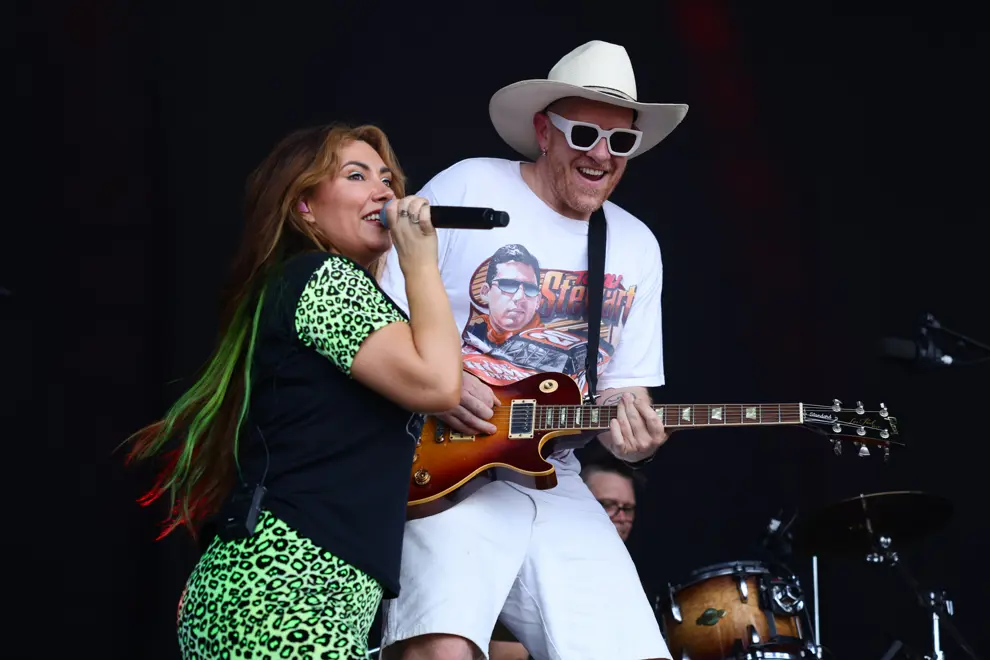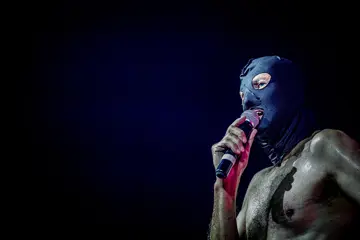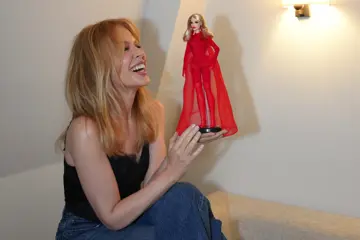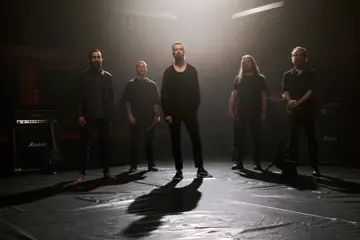 Killing Heidi
Killing HeidiWhen it comes to Australian bands who have witnessed fame at an early age, and then experienced a meteoric rise to wider recognition, it's hard to look past the likes of Silverchair. But, it was groups like that iconic Newcastle trio that showed Violet Town’s Killing Heidi that anything was possible.
Formed in the mid-'90s by siblings Ella and Jesse Hooper, Killing Heidi received their first taste of recognition back in 1996 when the duo were Unearthed by triple j's then-nascent talent-finding platform of the same name. Aged only 13 at the time of its recording, their single Kettle showed early promise for the regional outfit, and gave them a taste of the future that lay before them.
But did Killing Heidi ever think they could make some sort of impact on Australian culture at that time? Putting the question to the pair over a Zoom call results in little more than a shared laugh. "Just the fact that we're both laughing tells you everything you need to know," Ella admits.
"It was a bit of a pipe dream," echoes Jesse. "It's the same for a lot of creatives, where you have this passion for something but you've got no idea how that's actually going to translate and manifest or develop.
Don't miss a beat with our FREE daily newsletter
"And especially since we were from a regional area where it just felt so disconnected from the bands, the culture, and the sounds that we were just loving, and although we had triple j giving us this insight into the world of this cool music scene, it really was hard to believe that we would ever be a part of it other than just a receptor, you know.
"It was a wild ride, and then it turned into a rollercoaster of a few years of crazy fun," Jesse adds.
That rollercoaster officially took off around 1997 when the band were signed to Paul Kosky's Wah Wah Music label. Based on the promise they showed, the band then filled out with additional members, and in 1998, they began writing the music that would appear on their debut album, 2000's Reflector.
"We were kind of sitting on a finished or almost finished version of Reflector for about a year, and even then it felt like this might never come out," Jesse admits.
"We now know that's really normal because, getting it made is one thing, getting it out is another thing, and having it be successful is the rarest of ducks," Ella adds. "They're all such rare achievements, to then make that success sustainable and grow it and stick around, I feel like we somehow magically nailed three out of the four.
"The shock and surprise of us being in that moment, having those opportunities when we had them is something that stayed with us for a really long time. The 'pinch me' factor really lasted because we couldn't effing believe it.
"We were just like, 'Two years ago I was bumping along on the school bus listening to the radio going, "Oh man, I want that so bad. That would just be my dream."'" Ella adds. "Then two years later, you are literally living that dream and you've got thousands of people in front of you and you're just a bit like, 'What the fuck just happened?'"
It didn't take long for success to come Killing Heidi's way. Their debut single, Weir, was released in July of 1999 with Mascara following up soon afterwards. The former would peak at No. 6 on the ARIA charts and the latter would top it, with both being certified Platinum. Months later, Weir would hit No. 2 on the triple j Hottest 100 of that year – the highest-charting spot for an Unearthed artist until Vance Joy's Riptide topped the poll in 2013.
For those who weren't around at the time, it might be a little difficult to gauge just how popular Killing Heidi were at the time. Upon the release of Reflector in March 2000, the album hit the top of the ARIA charts, quickly becoming the fastest-selling album in Australian music history up to that point.
That same year, they were nominated for seven ARIA Awards, ultimately taking home Album Of The Year, Best Group, Best Rock Album, and Breakthrough Artist – Album. The following year, they nabbed another two nominations, with the success of Superman/Supergirl seeing them in the categories for Producer Of The Year and – again – Best Group.
It was rare to open a music magazine and not see Ella's trademark look staring back at you, and as teenagers wrote the band's name on their pencil cases and loudly sung their praises from all over the country, the Hoopers remained relatively humble. While some might say that such success would mean plenty of bragging rights, they were far more grounded in regards to the possibilities it meant for them.
"For us, it was just the fact that it would mean we could continue doing what we were doing," Jesse remembers. "At that point it was just about more opportunities opening up. Just like, 'Cool, all these extra things are happening. We get to play more, there'll be another album coming out, we'll get to do more songwriting.
"So it was probably just more like, 'Great, we get to to keep doing this and we're on the right track.' It was the validation of like, 'Cool, it's not just one little, little moment.' It was, something that we could then have as a career.
"It was just that excitement of feeling like we belong in this scene and in this industry, and we get to keep doing it," he adds. "As we kept rolling along, it probably became other things, like being more aware of what we wanted to do creatively and all that kind of stuff. But originally I think it was just the fact that we get to keep doing this."
"I think that was the era of multi-album deals too – which we didn't do" adds Ella. "Killing Heidi had a very unique behind-the-scenes commercial history too. Wwe signed one album deals with various companies at a time where it was more usual to sign seven and then the next en of your life were kind of locked up.
"Our experience was so unusual and my first feelings around success and then maintaining it I think are quite unusual, because we kept getting to restart with different teams and I don't know whether that's a good thing or a bad thing actually.
"It didn't take long to realise that everybody wanted to replicate the success of Reflector, which is lightning in a bottle, baby – it literally only happens once," she adds. "There's nowhere to go. There was a lot of pressure. I remember after those beautiful hazy days after the Reflector cycle eventually wrapped up, there was a little bit of 'Oh fuck' as well."
Indeed, there would have been a little bit of pressure for Killing Heidi to try and replicate the success of an album like Reflector, and by the end of 2001, the group provided a taste of what was to come with Heavensent.
Close to a year later, they released Present as their second album, with a self-titled record following in 2004. They were all successful, with Present charting at No. 12 and the self-titled effort hitting No. 7, but none quite matched the commercial peak of Reflector.
"It was tricky to be honest," Ella remembers. "If we could have our time again, I think both Jess and I would do it very differently. We would probably rest a bit more and reframe a bit more, and maybe even do our sort of songwriting phase more like the way we did with Reflector, which was the two of us in a beautiful calming country environment.
"But then again, I'm saying that now as an adult, and probably 17-year-old me would've screamed, 'No, no, no, don't you dare take me to a barn with my brother for three months. I wanna go rage in the city,' or whatever.
"But, it was tricky to navigate because I almost feel like we never got to stop touring and focus on that next record properly; creatively," she adds. It is what it is. The machine be machining."
By 2007 though, the band were inactive. Notably, no announcement of a disbandment or hiatus was ever put forth, so questions emerged as to what the status was. A few years later, Ella and Jesse could be found as members of The Verses, but it wasn't until 2016 that Killing Heidi made an official comeback.
After years of sporadic shows, this year has brought with it news of the record's 25th anniversary. As a result, Killing Heidi are reissuing the record as part of a deluxe package on vinyl and CD, complete with demos and rarities.
They’re also hitting the road for a national tour, performing the record in full while giving fans the chance to relive the band’s explosive moment of arrival.
However, the decision to take the record on the road in full comes from these years of shows where the band found themselves playing festivals and occasional headline dates full of hits and fan favourites. In 2024 however, the band were offered the chance to perform at the Good Things festival and play the album in full.
"We rehearsed the album in full and it was such a cool thing to do," Jesse remembers. "The reception was absolutely bonkers. It reminded us of the Big Day Out festival where we were on a side stage and it got so out of control because the majority of the crowd of these festivals wanted to squeeze into the side stages and it became a safety issue.
"It was just one of those zeitgeist moments of how this band is too big for where they were allocated. So the Good Things Festival had a little bit of a flavor of that, but we had a few technical issues. We never actually got to play the whole set in full."
With the band rearing to actually play the album in full, it was a moment of serendipity where the timing provided a chance to celebrate an important milestone in the band's life as they look back and – at the risk of using a terrible pun – reflect on everything that has come since.
"We've been working with Universal for a few years now, and we had some delays with COVID," Jesse remembers. "We had some plans around the 20th anniversary that we had to put on ice, so it just feels like the perfect storm. We've got some unreleased demos that we've dug up from the vault, which I don't think we've ever listened to up until this point, and a whole bunch of unreleased versions of songs.
We've got Destroy All Lines, who did the Good Things festival, onboard to promote, and it just feels like a perfect moment to celebrate that era and those songs. The response in the past month or so has just been quite special. It's exciting to see there's such a passion and it's not just us, it's just that music connected with people at a level which is very unique and very special.
"We are just very grateful that we get to sort of. step back into that for everyone else and for ourselves," he adds.
Most importantly, the record also manages to provide a bit of fan service, and to give back to their legions of followers after years of being – as Ella puts it – "fussy" about what they've wanted to play in recent years. It's an opportunity to harken back to those days when full albums like Reflector would get into the heads of fans and stay there for months, ultimately becoming an integral part of one's personality.
"I've come to realize that culturally, emotionally, and psychologically for a lot of people, Reflector allowed them to fly their freak flag," Ella notes. "And to sort of look at Jess and I, the weird wackiness of this band, and how we became the poster kids for the idea of 'Do your own fucking thing and don't go through the cookie cutter route,' I'm so glad. That means so much to me.
"We've had people share their coming out stories, we've had people share their leaving home stories, giving them the strength to get through hectic teenage depression or suicidal ideation, and this is their soundtrack. Also, teenage romances and crushes and love stories and all that beautiful sort of teen, Dawson's Creek end of things as well.
"But it runs the gamut, it's just one of those soundtrack albums, and we are so honored that that's our album," she adds. "That is literally the life changing summer for us. We just can't believe that we created – as a brother/sister writing team – an album that encapsulates some of that really core stuff for people. It's just a total honour."
Of course, while we're looking 25 years into the past with the upcoming Reflector tour, what about the future? It's been 21 years since the release of new music from Killing Heidi, so what does the future hold? Will we be receiving new music at any point
"I always say never say never, but I don't know," admits Jesse. "At the moment, we're so into just celebrating these songs that people already love, Ella's got a solo career, we've had other projects on the go, but I don't know, it feels like not right now, at least."
"I work in both sides of the media too, I'm an interviewer and an artist and I work on podcasts, radio, TV and all that stuff," Ella adds. "Call me old and jaded, but I find it a little bit interesting when bands provide new music that… isn't asked for, shall we say?
"It's like, 'There's no need, just read the room guys.' So that's a big reason why I've always been like, 'No, we're good.' We'e got this music that people freaking love and know, and I don't personally feel the need to go 'Here's more, here's my new thing.'
"But if the mood in the room be changing. Well, who knows?" asks Ella.
"It sounds like there's a number of people where, if Ella reaches that threshold, then she's willing to cross that line, that's my interpretation of what she just said," quips Jesse. "Prove it, Australia!" Ella adds with a laugh.
Tickets to Killing Heidi’s upcoming shows are on sale now, with pre-orders for the 25th anniversary edition of Reflector available now.
Killing Heidi 25 Years Of Reflector Australian Tour
With special guests Siobhan Cotchin and Hassall
Friday, 20th June – The Gov, Adelaide, SA
Saturday, 21st June – Magnet House, Perth, WA
Thursday, 26th June – The Tivoli, Brisbane, QLD
Friday, 27th – June Liberty Hall, Sydney, NSW
Saturday, 28th June – Northcote Theatre, Northcote, VIC
This piece of content has been assisted by the Australian Government through Music Australia and Creative Australia, its arts funding and advisory body

















